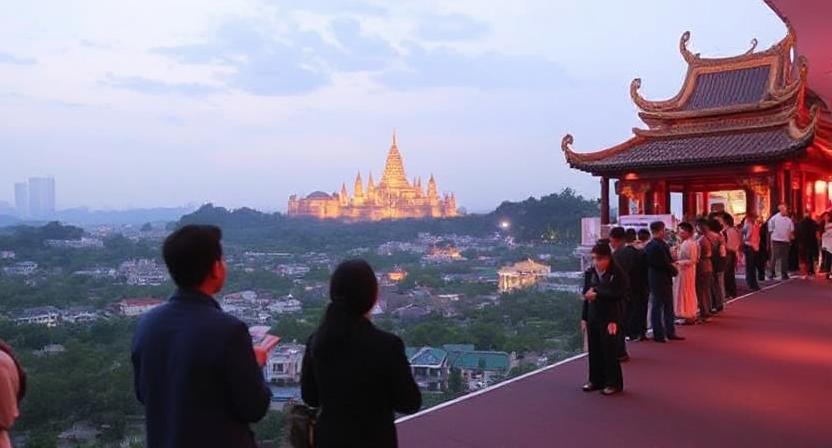Published on
November 3, 2025

The “Cambodia Festival” held in Suzhou, Jiangsu province, has not only boosted Cambodia’s tourism visibility but has also marked an important milestone in tourism collaboration between China and Cambodia. With the presence of key figures from both countries, including Huot Hak, Cambodia’s Minister of Tourism, and Li Chuan, Deputy Director-General of the Jiangsu Provincial Department of Culture and Tourism, the event created an impactful platform for cultural exchange.
The success of the festival has shown that more Chinese tourists are interested in visiting Cambodia due to its cultural richness and emerging status as a safe and hospitable tourism destination. The event was therefore also a promotion for Cambodia’s rich heritage, while the announcement of expanded tourism services would have further inspired travelers to see some of Cambodia’s famous landmarks such as the Angkor Wat temple complex, Phnom Penh’s Royal Palace, and the beaches of Sihanoukville.
Expanding Cultural and Historical Connections Between China and Cambodia
The Cambodia Festival was an excellent opportunity to showcase Cambodia’s historical and cultural treasures to a Chinese audience, which has increasingly shown interest in Southeast Asia’s heritage destinations. The event featured an array of traditional Cambodian performances, art exhibitions, and tourism booths, providing a comprehensive overview of what Cambodia has to offer in terms of cultural tourism.
For Chinese tourists, visiting Cambodia offers a unique cultural experience—not only through its historical temples but also through its vibrant art, craftsmanship, and traditional festivals. The increased cultural exchange is expected to deepen the understanding between Cambodian and Chinese cultures, fostering stronger tourism ties between the two nations. Chinese tourists are expected to engage with local communities in a way that fosters a mutual appreciation of heritage and traditions.
Tourism Growth in Cambodia: A Booming Destination for Chinese Travelers
According to data from the Cambodia Ministry of Tourism, China is now one of the largest source markets for Cambodia’s tourism sector, with over 1.5 million Chinese tourists visiting Cambodia annually. With tourism growth expected to continue, particularly as the global tourism industry rebounds, Cambodia’s focus on attracting Chinese visitors becomes even more important. The “Cambodia Festival” is part of the country’s broader initiative to build stronger connections with China and promote tourism exchange.
By targeting Chinese tourists, Cambodia is tapping into one of the fastest-growing tourism markets in the world. The Cultural Tourism Initiative, combined with enhanced tourism services, has led to a rise in the number of Chinese visitors interested in the country’s cultural experiences. The appeal of Cambodia’s historical landmarks, traditional festivals, and authentic experiences is drawing tourists from all regions of China, contributing to Cambodia’s tourism recovery and growth.
Digital Innovation in Cambodia’s Tourism Sector: Enhancing the Visitor Experience
In addition to cultural promotion, digital innovation is playing a critical role in improving the tourism experience in Cambodia. The launch of digital tourism platforms allows Chinese tourists to access up-to-date information on travel options, tour packages, and local attractions. These platforms provide an interactive, user-friendly interface that makes planning trips to Cambodia easier and more efficient.
By implementing digital tools such as mobile apps, online booking systems, and tourist information portals, Cambodia is enhancing the overall visitor experience for international tourists. These digital solutions enable Chinese visitors to easily navigate Cambodia’s tourist spots and book accommodations, tours, and transportation in real-time.
The use of technology in the tourism industry ensures that Cambodia’s tourist economy remains competitive in the global market, offering convenience and reliable services that travelers expect in today’s digital-first world.
Cambodia’s Growing Role as a Sustainable Tourism Destination
As Cambodia continues to grow as a tourism hub, sustainability will play an increasingly important role in the country’s long-term tourism strategy. The Cambodian government is taking steps to promote eco-tourism and sustainable tourism practices that protect the country’s natural resources, including forests, wetlands, and biodiversity.
For example, sustainable tourism products such as eco-friendly resorts, cultural experiences, and community-based tourism initiatives are becoming more popular. These efforts allow tourists to explore Cambodia’s cultural and natural heritage while contributing to local communities and environmental protection. By promoting green travel options, Cambodia is positioning itself as a sustainable destination for eco-tourism travelers, particularly those from China, where eco-conscious tourism is growing in popularity.
Strengthening Economic Ties Through Tourism Investment
The growing tourism sector in Cambodia is also benefiting from international investment, which is increasingly coming from China. As Cambodia continues to develop its tourism infrastructure, investments from Chinese firms are helping to enhance the tourist experience and support local businesses. These investments include the construction of new hotels, tourism facilities, and transportation services to accommodate the increasing number of tourists from China.
This influx of tourism-related investments further strengthens the economic ties between China and Cambodia, creating a positive cycle of growth in both countries. As Cambodia’s tourism sector expands, these investments will continue to provide economic opportunities for local entrepreneurs and business owners in the hospitality and tourism industries.
A Bright Future for Cambodia’s Tourism Industry
The country, through its appeal as a cultural destination, coupled with the effective promotion of its heritage during the “Cambodia Festival”, makes it a primary tour destination in Southeast Asia. This increase in the number of Chinese tourists, further driven by digital innovation, sustainable tourism practices, and events promoting cultural exchange, surely is an indication that Cambodia’s tourism industry will remain at the top for several years to come.
With the growth in tourism, international partnerships, and eco-friendly development, Cambodia is positioning itself as a world leader in cultural and eco-tourism, attracting more and more tourists from China and the rest of the world. The Cambodian tourism industry has great potential, with its philosophy rooted in the principles of sustainability, responsible tourism, and local ownership.







